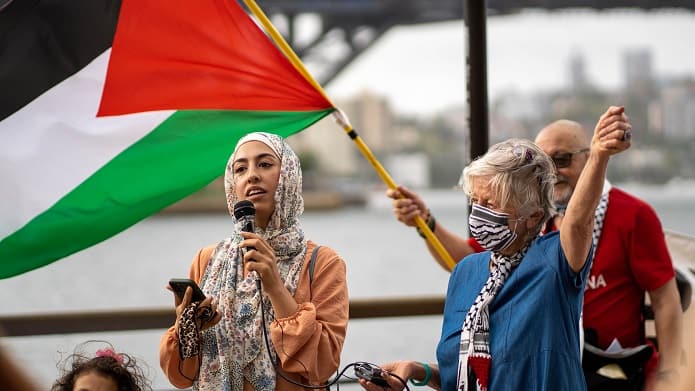More than 40 per cent of performances at this year Sydney Festival have now been disrupted with more than 100 artists and companies withdrawing in opposition to the festival’s “artwashing” of Israeli war crimes and apartheid. Solidarity spoke to Fahad Ali, one of the organisers of the boycott campaign and a member of the Palestine Justice Movement Sydney, about how the boycott developed.
In November, the Sydney Festival program launched publicly. A number of Arab artists who were taking part noticed a logo for the state of Israel on the program.
That was brought to the attention of Arab Theatre Studio, a Western Sydney-based collective, and Michael Mohammed Ahmed, director of Sweatshop, a literacy movement in Western Sydney for people of colour.
The sponsorship was ostensibly being used to support a production choreographed by an Israeli dance company. The Israeli Embassy was hosting a reception at the Sydney Opera house.
Mohammed was in the process of being appointed to the Sydney Festival board. He brought this back to a group of community based artists and activists. We put together an open letter and met with the board to ask them to cancel this partnership.
What they were doing is allowing the festival to be used to give respectability and a positive image to the Israeli regime, an apartheid state.
It actually emerged that the Sydney Festival had approached the Israeli Embassy for support in May 2021, when the evictions of Palestinian families from Sheikh Jarrah in occupied Jerusalem, and Israeli bombardment of the Gaza Strip including hospitals, schools, even a tower [housing] the international press [were happening].
They said that Sydney Festival is a non-political organisation and could not divest from the sponsorship. But accepting money from one of the most politically contentious states on the planet is necessarily political.
Mike Mohammed Ahmed immediately ended his appointment to the Board.
Arab Theatre Studio as well as Bankstown Poetry Slam withdraw from the festival.
We told them we would call on other artists to boycott.
They probably didn’t think that the withdrawal of two groups was going to have a big impact but now they’ve seen about a quarter of their original program pull out.
Apartheid
We were clear from the beginning that this was not about a particular dance event or an Israeli choreographer. This was about the Israeli state sponsorship.
There are many artists for whom this is not a hard question. They refused to be complicit with apartheid and an organisation that takes blood money. Given COVID and the position that artists have been in over the past two years this is not an easy ask.
The first artists to pull out were all Indigenous, people who are directly affected by settler colonialism and understand this call.
This is the biggest BDS action that’s ever occurred on this continent. I’m blown away by the reaction that we’ve received from artists.
The BDS movement is a response from Palestinian civil society modelled on the boycott movement targeted towards apartheid-era South Africa.
It aims to bring pressure to bear on Israel from every angle—economic, social, political, academic, cultural.
What BDS does most effectively I think is open space to get people thinking about Israeli apartheid, how people in Gaza live under a continual state of siege, and the West Bank is under military occupation and has been for 70 years. We’re gaining attention on this in a way that we haven’t before.
In the last year Human Rights Watch and Israeli NGO B’Tselem have declared that Israel is an apartheid state. As the BDS movement grows, you’re now seeing people in the press saying it. It normalises discussion about Palestine.
A lot of people have told me that they didn’t really think about Palestine seriously until the events of May 2021.
We need a continual campaign of grassroots activism to draw focus to these questions. And that’s what the BDS campaign here has done really well.
You can find the campaign on Twitter.
Protests and theatre staff back boycott
Over 50 people joined a protest on the opening night of Sydney Festival at the Opera House in early January, including a street theatre performance condemning “Artwashing for apartheid”.
Union members who work at Carriageworks, one of the festival venues, have been protesting by wearing “Free Palestine” badges during their shifts. Six staff have also given up shifts and turned down work for the duration of the festival in support of the boycott.
Most of these workers are employed as casuals and rely on their jobs for income.
Carriageworks management told workers they were welcome to turn down shifts. But workers wearing badges have faced intimidation and were told not to share their “personal” beliefs at work as it went against the code of conduct. This is incredibly hypocritical given the anti-colonial image arts venues such as Carriageworks like to pride themselves on.
In response, the Media Entertainment and Arts Alliance (MEAA) released a statement supporting “the right of our members to express their personal views in this way in the course of their employment”, saying this was “part of the rich mix of expression and exchange in a vibrant creative community”.
The Sydney branch of the Maritime Union of Australia has since released a statement backing the festival boycott.
Protest report by Tooba Anwar






